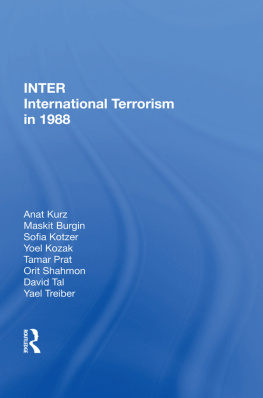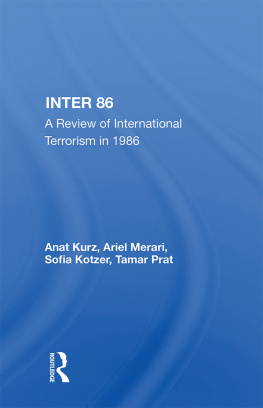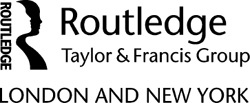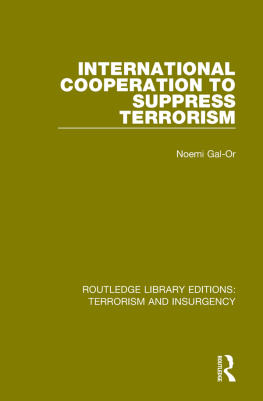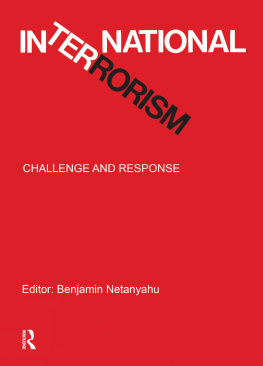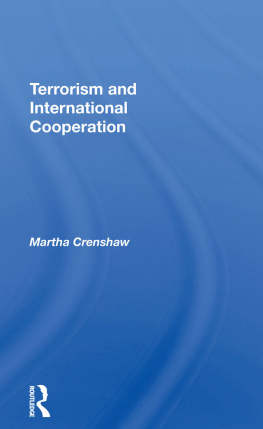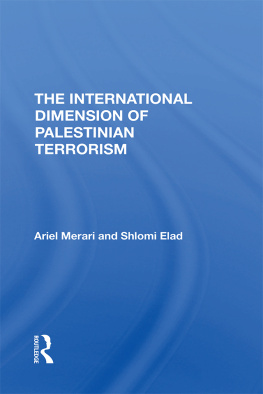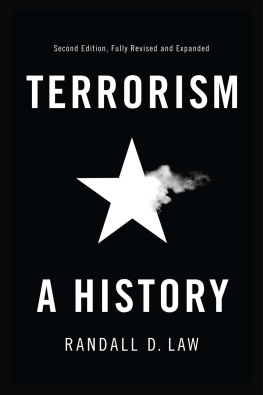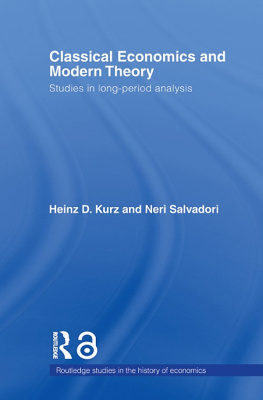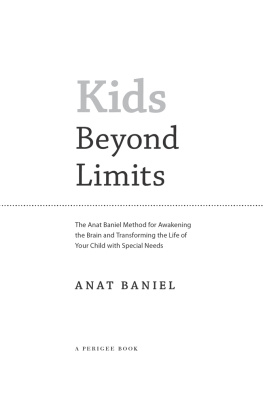INTER International Terrorism in 1988
JCSS Publications
JCSS publications present the findings and assessments of the Centers research staff. Each paper represents the work of a single investigator or a team. Such teams may also include research fellows who are not members of the Centers staff. Views expressed in the Centers publications are those of the authors and do not necessarily reflect the views of the Center, its trustees, officers, or other staff members or organizations and individuals that support its research. Thus the publication of a work by JCSS signifies that it is deemed worthy of public consideration but does not imply endorsement of conclusions or recommendations.
Editor
Aharon Yariv
Executive Editor
Joseph Alpher
First published 1989 by Westview Press
Published 2018 by Routledge
52 Vanderbilt Avenue, New York, NY 10017
2 Park Square, Milton Park, Abingdon, Oxon OX14 4RN
Routledge is an imprint of the Taylor & Francis Group, an informa business
Copyright 1989 by Tel Aviv University, Jaffee Center for Strategic Studies
All rights reserved. No part of this book may be reprinted or reproduced or utilised in any form or by any electronic, mechanical, or other means, now known or hereafter invented, including photocopying and recording, or in any information storage or retrieval system, without permission in writing from the publishers.
Notice:
Product or corporate names may be trademarks or registered trademarks, and are used only for identification and explanation without intent to infringe.
Library of Congress ISSN: 86-645044
ISBN: 0-8133-0960-3 (U.S.)
ISBN: 965-356-009-3 (Israel)
ISBN 13: 978-0-367-00368-5 (hbk)
Acknowledgments
InTer is the annual survey of the Jaffee Centers Project on Low Intensity Warfare. Compiling it is a demanding task that calls for intensive efforts by each and every member of the Projects staff. They deserve credit not only for their achievements in collating and analyzing raw data, but also for their valuable teamwork.
Many additional people assisted in producing this report. In particular, the JCSS Information Center, directed by Moshe Grundman, supplied the media clippings and other sources of information that formed the basis for data collection and analysis.
Special thanks are due to Joseph Alpher, Deputy Director and Executive Editor of JCSS, whose professional contribution was critical in publishing the survey.
Anat Kurz
Table of Contents
, by Anat Kurz
, by Anat Kurz
, by Anat Kurz
, by Mask.it Burgin
by Sophia Kotzer
1.
Introduction
This report surveys international terrorism in 1988. It is the fifth annual survey of its kind published by the Jaffee Center for Strategic Studies Project on Low intensity Warfare. As in previous years reports, the current survey contains statistical data that delineate various aspects of international terrorism, as well as brief articles that analyze major current issues in international terrorism. This year the articles include a discussion of the ongoing affair of foreign hostages in Lebanon--an update of a chapter in last years InTer , and of Foreign Hostages in Lebanon (JCSS Memorandum no. 25, August 1988)--and an analysis of trends in Palestinian international terrorism. A chronology of significant international terrorist events in 1988 is included, as well as extensive tables and a glossary of terrorist organizations.
The report is based on data collected, collated and computerized at the JCSS Project on Low Intensity Warfare. That project was established in 1979. Its aims are to maintain a data base on terrorism around the world, to issue periodic situation reports, and to conduct studies analyzing the processes, trends and phenomenon of low intensity warfare.
The Projects data base on terrorism contains three files:
Terrorist Events --a systematic cataloguing of international as well as domestic terrorist incidents that take place in most parts of the world;
Terrorist Groups --a continually updated collection of information on terrorist groups around the world, according to a predetermined list of detailed categories; and
Countries Attitudes to Terrorism --monitored and documented information on the various forms of state support for terrorist groups, as well as on the methods states use to combat terrorism.
For purposes of data collection, a terrorist group is defined as an organization other than a state (although it may enjoy state support and/or act in the service of a state) that resorts to the systematic use of violence in order to achieve political ends. A terrorist incident is any violent activity conducted by a non-state organization in order to attain political objectives. An international terrorist incident (in contrast to a domestic incident) is defined as a terrorist incident that in some way involves more than one state. In addition to these categories, the JCSS data base monitors international terrorist activity conducted by direct emissaries of states on foreign territory.
The data base relies mainly on information from the mass communications media (primarily dailies, weeklies and periodicals), professional publications, and government releases. Media information concerning terrorism is problematic for two reasons: first, coverage of events, especially those taking place in remote parts of the world, is sometimes deficient--although international terrorist incidents are generally covered better than domestic ones, and terrorist activity involving western interests receives particularly good coverage. The second point is related to the clandestine nature of terrorist activity. Information about the actual perpetrators and their intentions is sometimes incomplete, contradictory, or simply absent. However, there is usually no doubt regarding the very occurrence and the physical results of an incident.
As mentioned above, international terrorist incidents are defined as those events in which more than one country is involved. Nevertheless, in the present report, as in previous ones, we excluded incidents that formed part of an underground struggle conducted by rebels against a foreign army in their own country. Inclusion of violent events associated with struggles of this sort would considerably distort the picture of international terrorism. Thus, statistics in this report do not contain attacks on the IDF in Lebanon, events in the struggle conducted by the local population against the Vietnamese Army in Kampuchea, or clashes between Afghan rebels and Soviet units.
The statistics also refer to incidents carried out by states agents when the attacks targeted either the public-at-large or individuals not associated with a dissident organization involved in terrorism. Statesponsored attacks against members of terrorist groups are considered part of a counterterrorism effort conducted by the state, and are excluded from this report.
2.
International Terrorism in 1988: Main Features
A total of 433 international terrorist incidents were recorded in 1988. As defined in the introduction above, international terrorism refers to incidents that in some way involve more than one state. Yet a salient characteristic of international terrorism throughout the years has been that the major part of incidents targeted foreign objectives within the borders of the perpetrators own country. In 1988, attacks of this kind comprised 69.6 percent of the total of international terrorism. This persistent trend apparently reflects logistical feasibilities.

